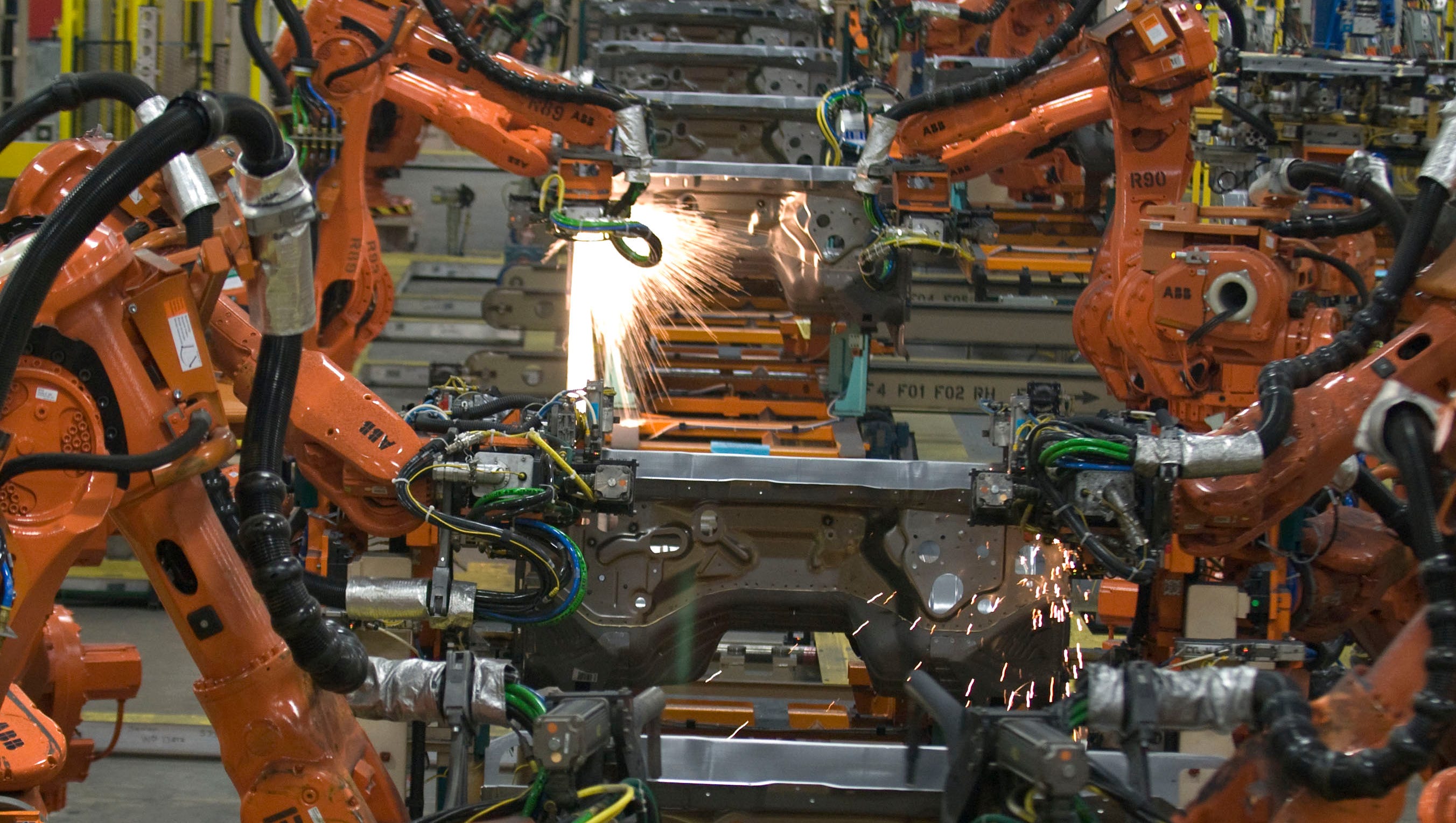Autoworkers disgruntled as U.S. production continues amid virus outbreak
 Breana Noble
Breana Noble
Widespread plant closures in Europe are a harbinger for the U.S. automotive industry, experts said, as auto workers expressed concerns over conditions in their plants and some walked off the job over fears of the novel coronavirus pandemic.
Paint shop operations resumed at Fiat Chrysler Automobiles NV's Warren Truck Assembly Plant early Monday afternoon after 17 employees stopped working that morning. There were no confirmed cases of COVID-19 at the plant that produces the previous-generation Ram pickups, the company said.
But Gov. Gretchen Whitmer has directed gyms, theaters, dine-in restaurants and schools to close to curb exposure, and many employers, including Detroit's three automakers, are letting employees work from home if they can. President Donald Trump issued new guidelines at the White House telling Americans to congregate in groups of 10 or less.
"You have 1,500 to 2,000 people touching the same product," Kristin Dziczek, vice president of industry, labor and economics at the Center for Automotive Research in Ann Arbor said of workers on the assembly lines. "They're in close proximity. They wear gloves, protective gloves, but the level of contagiousness of this virus is high. It will spread differently in the manufacturing industry than in an office. I will not be surprised to see production interruptions."
Production at the Warren plant, which employs 2,613 people on two shifts, was unaffected by the walkout, Fiat Chrysler spokeswoman Jodi Tinson said. That was unlike a roughly 24-hour walkout last week by Canadian labor union Unifor members at Fiat Chrysler's Windsor Assembly minivan plant, which did stop production. No one there had tested positive for COVID-19, though a colleague was in self-quarantine.
The United Auto Workers did not immediately have comment on the Warren walkout. On Sunday, the union announced with top leaders of Detroit's three automakers the formation of a task force to discuss best practices to keep workers safe. The group had met for most of Sunday and were continuing to meet Monday, UAW spokesman Brian Rothenberg said.
But UAW Local 600 in Dearborn has filed a grievance against Ford Motor Co. requesting more be done to protect workers. The 20-point grievance requests a two-week work stoppage for employees to self-quarantine, hand sanitizing stations at each workstation and frequent cleaning of restrooms and the cafeteria, according to a copy of the grievance summary obtained by The Detroit News. Local leaders did not immediately respond to request for comment.
Other UAW local leaders also are calling for temporary production halts. Herb Hibbs, Ford's Louisville Assembly Plant chairman, wrote a letter to the automaker on Saturday. Ford is hiring additional people to clean the plant, he said, and there are extra efforts to clean doorknobs, turnstiles and breezeways. Hand sanitizer stations have been ordered.
"They're doing everything they can within reason with the supplies they have," Hibbs said. "What’s going on with the community is a lot bigger than just Ford. The last thing we want is a case in the facility. They're worried about the family members they are caring for, the elderly parents they are caring for."
Several Ford and Fiat Chrysler workers reached out to The News with concerns over the conditions in their plants, including dirty surroundings, a lack of hand sanitizer stations and no running warm water or antibacterial soap. They requested anonymity for fear of losing their jobs.
In a statement, Ford said it has asked its workforce to bring concerns to the attention of plant management. "We're pleased that this is occurring and we are taking immediate action to address those concerns," the company said. Additionally, CEO Jim Hackett in a letter to employees on Friday said the company would shut down a facility for 24 hours if a worker there was diagnosed.
A salaried employee last week at Fiat Chrysler Kokomo Transmission Plant in Indiana did test positive for COVID-19. He along with workers with whom he came into contact were quarantined, though operations continued and his workspace was sanitized.
Fiat Chrysler has increased housekeeping services in high-traffic areas, and crews over the weekend conducted additional cleaning. Employees are given gloves, rags and spray bottles with disinfectants to clean their stations before and after shifts. Breaks are being staggered, and the company is increasing space between employees where possible. Some plants are installing partitions between work stations.
"Plant management and local UAW leadership are performing frequent reviews to ensure proper protocols are followed," the company said in a statement.
While shutdowns typically are very costly for automakers, analysts say, they may not matter in the end. They predict demand will take a tumble as stores and schools close across the country. Ford has said showroom traffic is down in certain parts of the country.
"We saw Seattle pull back further than the national number in the last week’s data," said Jeff Schuster, president of global vehicle forecasting at market analysis firm LMC Automotive. The virus has "pushed some people to car dealers because they have time now, but I think eventually all of that goes away and people will stay home. It's just a matter of if people stay home or not and listen to that notion of expanding the social distancing."
Schuster says demand could fall by double digits, though not likely to the nearly 80% drop seen in China year-over-year in February. But even a small slump can be costly: If for just one week, people did not buy any vehicles, the companies could lose $7.3 billion in revenue, the economy 94,000 jobs and the government $2 billion in receipts, according to the Center for Automotive Research in Ann Arbor.
"It's not out of the realm of possibility," Dziczek said. "If people don't buy cars for a week, it's going to be painful."
Europe is seeing the product of declining demand now after many businesses except grocery stores and pharmacies shutdown in Italy, Spain and elsewhere. Fiat Chrysler has halted eight of its European plants for two weeks because of "the interruption in market demand," though it expects to be able to make up lost product. Still, its shares fell almost 22% by close, while General Motors Co. was down 15% and Ford dropped 11%.
French automaker Groupe PSA, Fiat Chrysler's pending merger partner, also closed its 15 European plants, citing supply disruptions and the "declines in the automobile markets." And Ford on Sunday shut down for one week its engine and assembly plant in Valencia, Spain, after three employees there tested positive for COVID-19.
"We'll close it for a week," Ford spokesman T.R. Reid said. "We'll assess and see what's safe and appropriate from there."
Western Europe could see sales decline by 11% year-over-year from 14.316 million vehicles in 2019 because of the virus, according to an "optimistic" analysis by the Center for Automotive Research at the University of Duisburg-Essen in Germany. Even with the previously expected drop in sales for 2020, the coronavirus increases the decline by a million vehicles.
"My impression is this is the largest and biggest problem we have had since World War II," said Ferdinand Dudenhöffer, director for the center in Germany. "I believe it could be for the U.S. the same as 2009 when it collapsed. At that time, it was mainly the U.S. It was not China. Today, it's all three big markets, which seems to collapse."
Dudenhöffer predicts overcapacities will lead to layoffs and that automakers will launch initiatives to help pick up demand. Ford Credit has launched an ad campaign encouraging customers to call to discuss options such as delaying a payment if they are worried about meeting it.
After years of profits, however, Detroit's automakers are in a much better financial situation than they were heading into the Great Recession, Dziczek said.
"Is it going to be 2009/2009? My hope is not," she said. "The auto industry is battle-worn and battle-tested. They walked through the valley of death and came out on the other side. The decisions and restraints and profitability that they've experienced since then puts them in a way better position now to weather this storm. And it’s going to be a storm."
bnoble@detroitnews.com
Twitter: @BreanaCNoble